Optimering af SWAP-netværk til kvanteberegning
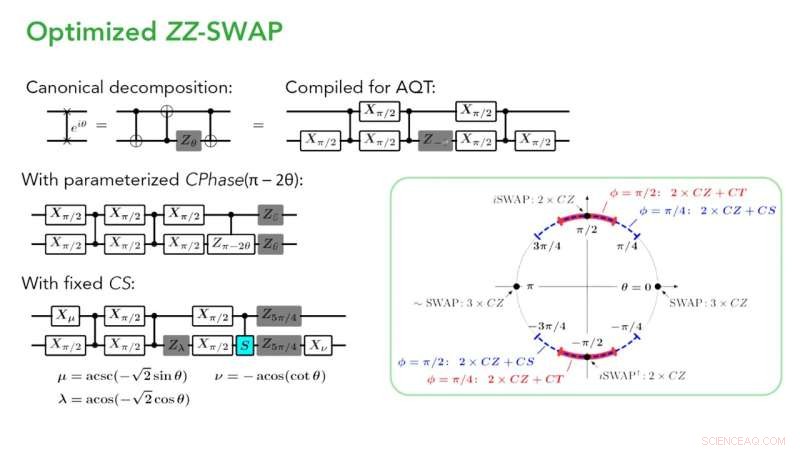
Omfattende skematisk over softwareoptimerede SWAP-netværk til AQTs porte. Kredit:Rich Rines/Super.tech
Et forskningspartnerskab ved Advanced Quantum Testbed (AQT) ved Lawrence Berkeley National Laboratory (Berkeley Lab) og Chicago-baserede Super.tech (erhvervet af ColdQuanta i maj 2022) viste, hvordan man optimerer udførelsen af ZZ SWAP-netværksprotokollen, der er vigtig for kvanteberegning. Holdet introducerede også en ny teknik til afhjælpning af kvantefejl, der vil forbedre netværksprotokollens implementering i kvanteprocessorer. De eksperimentelle data blev offentliggjort i juli i Physical Review Research , tilføjelse af flere veje på kort sigt for at implementere kvantealgoritmer ved hjælp af gate-baseret kvanteberegning.
En smart compiler til superledende kvantehardware
Kvanteprocessorer med to- eller tredimensionelle arkitekturer har begrænset qubit-forbindelse, hvor hver qubit kun interagerer med et begrænset antal andre qubits. Ydermere kan hver qubits information kun eksistere så længe, før støj og fejl forårsager dekohærens, hvilket begrænser kørselstiden og pålideligheden af kvantealgoritmer. Derfor skal forskere, når de designer og udfører et kvantekredsløb, optimere oversættelsen af kredsløbet, der består af abstrakte (logiske) porte, til fysiske instruktioner baseret på de native hardware-gates, der er tilgængelige i en given kvanteprocessor. Effektive kredsløbsnedbrydninger minimerer driftstiden, fordi de tager højde for antallet af porte og operationer, der er indbygget understøttet af hardwaren for at udføre de ønskede logiske operationer.
SWAP-porte - som udveksler information mellem qubits - introduceres ofte i kvantekredsløb for at lette interaktioner mellem information i ikke-tilstødende qubits. Hvis en kvanteenhed kun tillader porte mellem tilstødende qubits, bruges swaps til at flytte information fra en qubit til en anden ikke-tilstødende qubit.
I støjende intermediate-scale quantum (NISQ) hardware kan indførelsen af swap-gates kræve en stor eksperimentel overhead. Swap-porten skal ofte nedbrydes til native porte, såsom kontrollerede-NOT-porte. Når man designer kvantekredsløb med begrænset qubit-forbindelse, er det derfor vigtigt at bruge en smart compiler, der kan søge efter, nedbryde og annullere redundante kvanteporte for at forbedre køretiden for en kvantealgoritme eller applikation.
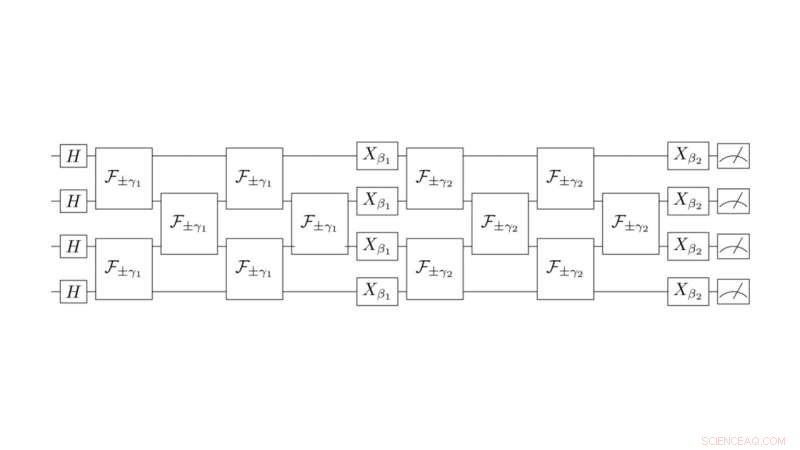
Skematisk over SWAP-netværk til QAOA på fire qubits. Kredit:Akel Hashim/Berkeley Lab
Forskningspartnerskabet brugte Super.techs SuperstaQ-software, der gjorde det muligt for forskere at finskræddersy deres applikationer og automatisere kompileringer af kredsløb til AQT's superledende hardware, især for en indbygget high-fidelity kontrolleret-S-gate, som ikke er tilgængelig på de fleste hardwaresystemer. Denne smarte kompileringstilgang med fire transmon-qubits gør det muligt at dekomponere SWAP-netværkene mere effektivt end standarddekomponeringsmetoder.
A network of ZZ SWAP gates requires only minimal linear connectivity between qubits without additional couplings, so it offers practical advantages for the efficient execution of quantum algorithms such as the Quantum Approximate Optimization Algorithm (QAOA). QAOA approximates solutions to combinatorial optimization problems—finding the optimal answer by giving a set of criteria. The Maximum-Cut problem, which can be used to arrange hubs on a transport grid system, is an example of a famous combinatorial optimization problem that can be potentially solved faster with QAOA using quantum circuits.
"One of the toughest challenges in quantum computing is to perform discrete logic operations. Because our control signals are analog and continuous, they're always imperfect. As we build more complex quantum circuits, the software infrastructure that optimally compiles gates tailored for AQT's hardware helps us achieve higher operational fidelity," Akel Hashim, the lead AQT researcher on the experiment and a graduate student at the University of California, Berkeley.
"A unique feature of quantum computing is that it enables partial logic gates. This feature has no parallel in traditional boolean logic—for example, your laptop computer can't execute 50% of an AND gate. AQT's ability to calibrate these partial controlled-S quantum gates opened the door for us to develop a wider array of novel optimizations to squeeze the most out of the hardware," said Rich Rines, formerly of Super.tech and currently a software engineer at ColdQuanta.
"A key software engineering challenge for this experiment was collaborating remotely, so we iteratively developed quantum circuit optimizations informed by the custom gates AQT's team calibrated. We optimized end-to-end by figuring out how to serialize these pulses while considering the hardware. We also figured out how to integrate open-source quantum software packages with our compiler, ensuring that our optimizations don't re-invent the wheel," said Victory Omole, formerly at Super.tech and software engineer at ColdQuanta.
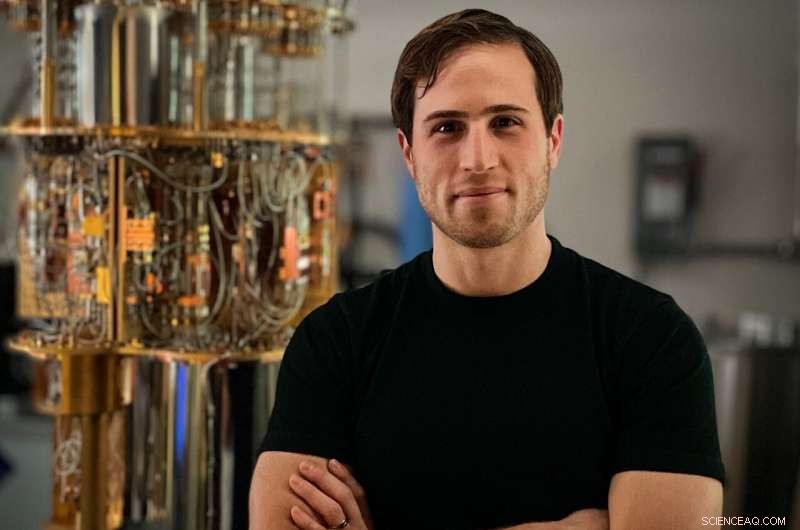
Akel Hashim, lead AQT researcher on the experiment. Credit:Akel Hashim/Berkeley Lab
As part of the experiment, the team also introduced a novel technique called Equivalent Circuit Averaging (ECA), which randomized the various parameters of the SWAP networks to generate many logically equivalent circuits. ECA randomizes the decomposition of quantum circuits, mitigating the impact of systematic coherent errors—one of the most severe errors in quantum computers and error mitigation at AQT.
"I proposed a way to merge my previous experimental work in randomized compiling with Quantum Benchmark (acquired by Keysight) using Super.tech's smart compiler to study a new way to reduce the impact of crosstalk errors," said Hashim. "I would not have had the insight to come up with this idea had I not worked with other researchers as part of AQT's user program. As someone who's going to enter the workforce, networking is critical to building a core base of people I know in the field who are experts in various areas, to whom I can pitch research ideas as well."
These experimental optimizations resulted in an improvement of up to 88% in the performance accuracy of QAOA. Researchers are looking to continue to explore and refine the methods in this work and apply them to other applications.
Supporting industry growth with an open-access research lab
AQT operates a state-of-the-art open experimental testbed based on superconducting circuits and is funded by the United States Department of Energy Office of Science Advanced Scientific Computing Research (ASCR) program. Technologies developed elsewhere can be deployed and field-tested at AQT, providing deep access to the full quantum computing stack at no additional cost.
Since the inauguration of its user program in 2020, AQT provided Super.tech, one of several industry users, with low-level access to the hardware to test their ideas. Few cloud-based quantum platforms offer this type of full access to the entire quantum computing stack and real-time feedback from the hardware experts at no cost. Super.tech collaborated with AQT's expert experimental team to learn ways to improve performance on this type of hardware.
"By revealing the inner controls of quantum hardware, AQT's collaborative approach with users drives innovation throughout the quantum computing stack. We look forward to continuing our research collaboration with AQT, and we will continue to share these results with the scientific community by publishing our learnings," said Pranav Gokhale, VP of Quantum Software at ColdQuanta and Super.tech former CEO and co-founder.
AQT at Berkeley Lab continues to grow as a cutting-edge hub for quantum information research and development by bringing together expertise and users, including early-stage startups, such as Super.tech, who now continue in their growth journey as part of ColdQuanta. + Udforsk yderligere
Breakthrough in quantum universal gate sets:A high-fidelity iToffoli gate
 Varme artikler
Varme artikler
-
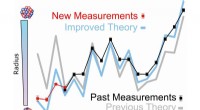 Forskere undersøger forvirrende størrelser af ekstremt lette calciumisotoperNår det undersøges nøje, FRIB-forskere fandt ud af, at radierne varierer på unikke måder, afspejler den indviklede adfærd af protoner og neutroner inde i kernen. Kredit:Michigan State University F
Forskere undersøger forvirrende størrelser af ekstremt lette calciumisotoperNår det undersøges nøje, FRIB-forskere fandt ud af, at radierne varierer på unikke måder, afspejler den indviklede adfærd af protoner og neutroner inde i kernen. Kredit:Michigan State University F -
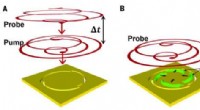 Forskere lancerer plasmoner med kontrollerede mængder vinkelmomentumSkematisk eksperimentel metodik. Kredit:(c) Videnskab (2017). DOI:10.1126/science.aaj1699 (Phys.org) – Et team af forskere med medlemmer fra institutioner i Tyskland og Israel har udviklet en må
Forskere lancerer plasmoner med kontrollerede mængder vinkelmomentumSkematisk eksperimentel metodik. Kredit:(c) Videnskab (2017). DOI:10.1126/science.aaj1699 (Phys.org) – Et team af forskere med medlemmer fra institutioner i Tyskland og Israel har udviklet en må -
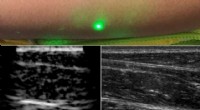 Forskere producerer de første laser ultralydsbilleder af menneskerEn ny ultralydsteknik bruger lasere til at producere billeder under huden, uden at komme i kontakt med huden, som konventionelle ultralydsonder gør. Den nye laser-ultralydsteknik blev brugt til at fre
Forskere producerer de første laser ultralydsbilleder af menneskerEn ny ultralydsteknik bruger lasere til at producere billeder under huden, uden at komme i kontakt med huden, som konventionelle ultralydsonder gør. Den nye laser-ultralydsteknik blev brugt til at fre -
 Demonstrationen af ultrahurtig skift til en isolerende-lignende metastabil tilstandTerahertz pulsdrevet amplitude-modus oscillation af ladningstæthed bølge rækkefølge i overgangsmetal dichalcogenid med et bikage gitter, 3R-TaSe2, der forårsager fremkomsten af en skjult isolerende
Demonstrationen af ultrahurtig skift til en isolerende-lignende metastabil tilstandTerahertz pulsdrevet amplitude-modus oscillation af ladningstæthed bølge rækkefølge i overgangsmetal dichalcogenid med et bikage gitter, 3R-TaSe2, der forårsager fremkomsten af en skjult isolerende
- Forskere forudsiger præcist indviklede udviklinger af mønstre med flere perioder i dobbeltlag
- Da Brazils vådområder brænder, regn er kun håb
- Cricket Habitat
- Supercomputer kommer med en profil af mørkt stof:Standardmodeludvidelse forudsiger egenskaber ved k…
- YouTubes børne-seere kan have svært ved at genkende reklamer i videoer fra virtuelle spilledatoer
- Foxconn når til enighed om at åbne Green Bay-kontoret


